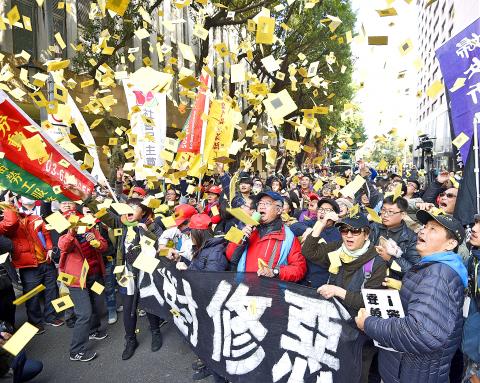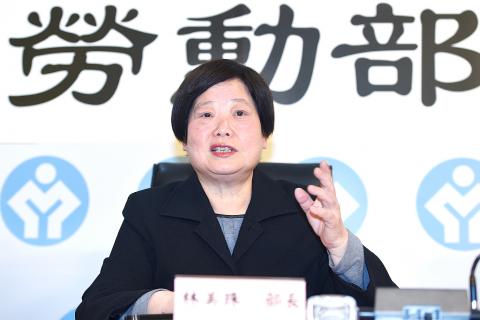The Ministry of Labor (MOL) yesterday said that President Tsai Ing-wen (蔡英文) has kept her campaign promise about reducing work hours, adding that the labor law amendment allows more flexibility for workers and businesses.
“President Tsai Ing-wen definitely did not break her campaign promise. The amendments to the Labor Standard Act (勞動基準法) did not change the underlying principles of the previous amendments, but only added more flexibility,” Minister of Labor Lin Mei-chu (林美珠) told a news conference at the ministry in Taipei.
The amendments allow for special circumstances in which employees can work up to 12 days consecutively, with a minimum rest time of eight hours between shifts and a monthly maximum overtime of 54 hours, on the condition that workers and employers agree to the conditions.

Photo: Chen Chih-chu, Taipei Times
Certain cases of special circumstances would require approval from regulatory authorities.
“The special circumstances will definitely not become the norm,” Lin said, adding that under normal circumstances workers would still have at least one day off every seven days, and their work hours, maximum overtime and overtime pay would essentially remain the same.
The ministry said it would look into regulations and measures necessary to supplement the amendment to better protect workers’ rights and develop mechanisms to ensure that special cases that have been allowed conform with rules about special circumstances.

Photo: Liao Chen-huei, Taipei Times
It would also improve the labor inspection system, and pay special attention to state-run enterprises and sectors that deal with public safety, such as transportation and healthcare sectors, when carrying out labor inspections, the ministry said.
“Last year, the ministry carried out more than 20,000 inspections and fined employers a total of nearly NT$200 million [US$6.76 million],” Occupational Safety and Health Administration Director Tzou Tzu-lien (鄒子廉) said, adding that when the amendments take effect on March 1, the ministry will continue to carry out inspections and increase the public’s understanding of the new rules.
“We dare not say the new labor law is perfect, but we have been working hard to protect workers’ rights,” Lin said.
Labor groups yesterday ended a three-day protest outside the Legislative Yuan after vowing to depose Democratic Progressive Party (DPP) legislators who supported the amendments.
Labor groups, including the Taoyuan Confederation of Trade Unions (TCTU), Taiwan Higher Education Union, the Hsinchu County Confederation of Trade Unions and the Confederation of Taipei Trade Unions, had been protesting the amendment since Monday by marching around the Legislative Yuan.
After the amendments were passed yesterday morning, protesters marched on to the legislature from their tents on Qingdao E Road and threw joss paper at the building.
The DPP has chosen to side with capitalists because of the political donations they receive from the corporations, a protester said.
“Since the DPP loves money so much, we are giving them all our joss money,” the protester said.
Protesters blamed Tsai for breaking her campaign promise and shouted that Tsai, Premier William Lai (賴清德) and DPP legislators are “murderers” for allowing more workers to die from overwork.
They also stopped by the Executive Yuan, where they threw joss paper into the air and some scuffled with police.
Before announcing the end of their protest at about 11:30am, the groups returned to the Legislative Yuan and tried throwing joss paper and smoke bombs into the building.
Labor groups would continue fighting even though the protest has ended, TCTU secretary Wu Chia-hung (吳嘉浤) said.
“One by one, we will depose every DPP legislator who supported the amendments,” Wu said.

An essay competition jointly organized by a local writing society and a publisher affiliated with the Chinese Communist Party (CCP) might have contravened the Act Governing Relations Between the People of the Taiwan Area and the Mainland Area (臺灣地區與大陸地區人民關係條例), the Mainland Affairs Council (MAC) said on Thursday. “In this case, the partner organization is clearly an agency under the CCP’s Fujian Provincial Committee,” MAC Deputy Minister and spokesperson Liang Wen-chieh (梁文傑) said at a news briefing in Taipei. “It also involves bringing Taiwanese students to China with all-expenses-paid arrangements to attend award ceremonies and camps,” Liang said. Those two “characteristics” are typically sufficient

A magnitude 5.9 earthquake that struck about 33km off the coast of Hualien City was the "main shock" in a series of quakes in the area, with aftershocks expected over the next three days, the Central Weather Administration (CWA) said yesterday. Prior to the magnitude 5.9 quake shaking most of Taiwan at 6:53pm yesterday, six other earthquakes stronger than a magnitude of 4, starting with a magnitude 5.5 quake at 6:09pm, occurred in the area. CWA Seismological Center Director Wu Chien-fu (吳健富) confirmed that the quakes were all part of the same series and that the magnitude 5.5 temblor was

The brilliant blue waters, thick foliage and bucolic atmosphere on this seemingly idyllic archipelago deep in the Pacific Ocean belie the key role it now plays in a titanic geopolitical struggle. Palau is again on the front line as China, and the US and its allies prepare their forces in an intensifying contest for control over the Asia-Pacific region. The democratic nation of just 17,000 people hosts US-controlled airstrips and soon-to-be-completed radar installations that the US military describes as “critical” to monitoring vast swathes of water and airspace. It is also a key piece of the second island chain, a string of

The Central Weather Administration has issued a heat alert for southeastern Taiwan, warning of temperatures as high as 36°C today, while alerting some coastal areas of strong winds later in the day. Kaohsiung’s Neimen District (內門) and Pingtung County’s Neipu Township (內埔) are under an orange heat alert, which warns of temperatures as high as 36°C for three consecutive days, the CWA said, citing southwest winds. The heat would also extend to Tainan’s Nansi (楠西) and Yujing (玉井) districts, as well as Pingtung’s Gaoshu (高樹), Yanpu (鹽埔) and Majia (瑪家) townships, it said, forecasting highs of up to 36°C in those areas